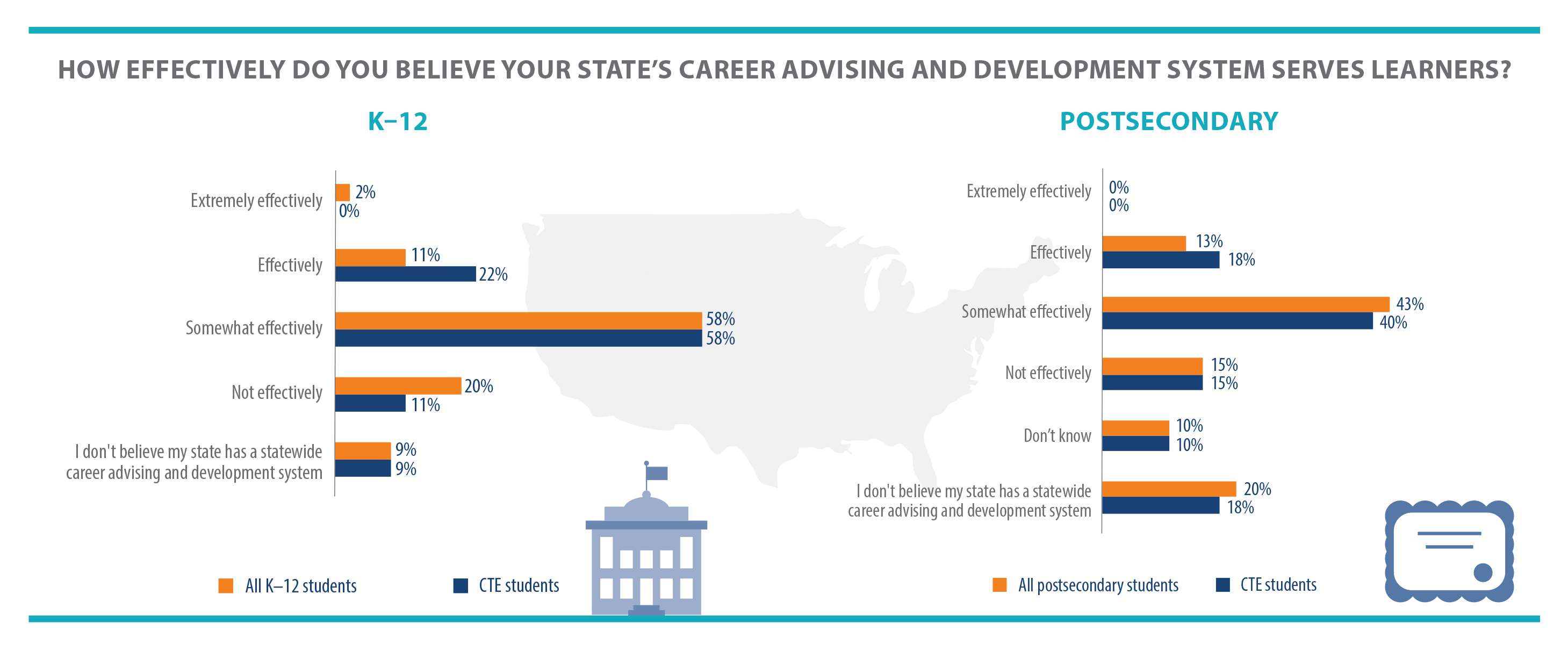Today, Advance CTE and the American School Counselor Association (ASCA) released a report exploring the strategies currently in place across the country to support career advising and development efforts. Too often, career advising and development only occurs at the high school level, even though learners should have access to career awareness, exploration and planning activities from elementary school all the way through postsecondary education. Anecdotally, many state and local leaders assume that this is not happening to the extent that it should be, but there has not yet been an in-depth examination of the data.
This topic has been a key focus of the New Skills for Youth (NSFY) initiative, a partnership of the Council of Chief State School Officers, Advance CTE and Education Strategy Group, generously funded by JPMorgan Chase & Co. NSFY has provided funding to 10 states to transform their career readiness systems, and all 10 participating states have strategies in place to improve their career advising and development activities.
Advance CTE, as part of NSFY, partnered with the American School Counselor Association (ASCA) to conduct research with three questionnaires. Advance CTE surveyed State CTE Directors, and ASCA sent separate surveys to a selection of school counselors and to State School Counseling Directors, in states where that role has been specifically identified. Some of the key findings include:
- Across the board, states are not overly confident in the effectiveness of their career advising and development systems. Fifty-eight percent believe they are only somewhat effectively serving K-12 students, and 55 percent believe they are either only somewhat effective or not effective at serving postsecondary CTE students.
- States, on average, are supporting a multitude of strategies at the K-12 level for career advising and development (an average of 5.7 strategies), yet they report mixed levels of effectiveness for both the individual strategies and collectively.
- Similarly, school counselors also employ many strategies (an average of 5.8) in their career advising and development work and generally feel more optimistic about the effectiveness of their strategies than states do about state-level strategies.
- School counselors who connect students with CTE coursework and career pathways find it an effective career advising and development strategy, but relatively few school counselors are able to make these connections:
- Only 27 percent of middle school counselors report that they connect students with CTE coursework or career pathways, even though this strategy is rated one of the more effective among those who use it, with 87 percent of the school counselors who use it in middle school labeling it as effective or extremely effective; and
- Sixty percent of high school counselors use connecting students with CTE coursework and career pathways as a career advising and development strategy, and 91 percent of those find it effective or extremely effective, with a full 50 percent labeling it extremely effective.
- School counselors struggle with balancing their heavy workloads and other counseling responsibilities, and they want more professional development and community conversations around career readiness to support their students more effectively.

The report examined numerous strategies currently in place to support career advising and development efforts. Wisconsin’s Academic and Career Plan, for example, is an ongoing process for middle and high school students that involves coordinated conversations around career interests and options, and that helps students make informed choices about career pathways. Texas has spent the last few years developing extensive virtual supports for school counselors, available through TXCTE.org and Texas OnCourse. These resources provide school counselors with messaging materials, lesson plans and other information on CTE and career advising. Maryland has leveraged state and organizational partnerships to develop several career advising strategies at the elementary and middle school levels, which incorporate career awareness and exposure with civic engagement and financial literacy.
To hear more about this report, join our webinar on February 20, which will feature presentations from ASCA and Advance CTE, as well as a local CTE practitioner.
Ashleigh McFadden, State Policy Manager

